|
|
|
Sort Order |
|
|
|
Items / Page
|
|
|
|
|
|
|
| Srl | Item |
| 1 |
ID:
110305


|
|
|
|
|
| Publication |
2012.
|
| Summary/Abstract |
In the United States, the decision to go to war has often been propelled by a singular event, a 'trigger' that both galvanises and unites, at least temporarily, the US Congress, the nation's press and the American public. The attack on Pearl Harbor precipitated US entry into the Second World War, and the attack on the World Trade Center on 11 September 2001 led to American military involvement in Afghanistan. In both instances, thousands of innocent Americans had been killed on American soil by an easily identifiable, foreign enemy. The United States entry into the Korean War resulted from a somewhat different kind of trigger. While US forces were not directly attacked, there was, as President Lyndon Johnson's Deputy Undersecretary of State George Ball once wrote, 'a massive land invasion by 100,000 troops … a classical type of invasion across an established border'. Ball argued that North Korea's invasion of South Korea in June 1950 provided 'an unassailable legal and political basis for counteraction'.
|
|
|
|
|
|
|
|
|
|
|
|
|
|
|
|
| 2 |
ID:
110292
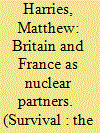

|
|
|
|
|
| Publication |
2012.
|
| Summary/Abstract |
In November 2010, as part of a broad-ranging bilateral defence agreement, the United Kingdom and France signed a treaty providing for limited cooperation on nuclear weapons. Modest in scope, and the product in immediate terms of economic pressure, the nuclear treaty's main substantive provision is for the joint construction of radiographic-hydrodynamic facilities. Beneath the surface of this treaty, however, lies a story of significant strategic shifts, and there are intriguing possibilities for future collaboration between the UK and France, and perhaps for trilateral cooperation involving the United States.
The potential for UK-French collaboration spans the spectrum of nuclear-weapons issues, from technology to policy, and perhaps to operational matters. These possibilities are sensitive, not only because they run into the everyday difficulties of political-military relations between the countries, but also for their relevance to two current debates: the ongoing battle over renewing the UK's fleet of strategic nuclear submarines, and international demands for multilateral nuclear disarmament.
|
|
|
|
|
|
|
|
|
|
|
|
|
|
|
|
| 3 |
ID:
110301
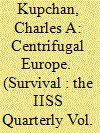

|
|
|
|
|
| Publication |
2012.
|
| Summary/Abstract |
The project of European integration is experiencing its gravest political crisis to date. Ongoing debate about how to restore the financial stability of the eurozone has exposed deep rifts within the EU, calling into question the solidarity that is the hallmark of political union. At stake is the survival not just of the euro, but the EU itself.
The EU's debt crisis poses a particularly potent threat to the project of European integration because it is both a consequence and a cause of a more serious malady: the renationalisation of European politics. Confronted with the powerful intrusions of both European integration and globalisation, electorates in EU member states have for the better part of a decade staged a mounting revolt against Brussels and its supranational brand of governance. Unwanted immigration, growing inequality, fraying welfare states, stagnant wages, bailout and austerity packages - these developments have produced a wave of popular discontent, which is in turn exacting a heavy toll on the EU as angry voters press for the repatriation of political control and the restoration of national autonomy.
|
|
|
|
|
|
|
|
|
|
|
|
|
|
|
|
| 4 |
ID:
110302
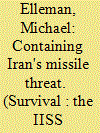

|
|
|
|
|
| Publication |
2012.
|
| Summary/Abstract |
In 2007 Washington announced that it would place long-range interceptors in Poland and an advanced missile-tracking radar in the Czech Republic as part of a larger system (known as the Third Site, after Ft Greely, Alaska and Vandenberg AFB, California) designed to protect the US mainland from the emerging Iranian ballistic missile threat. Moscow objected to the placement of missile-defence assets in Europe, claiming that their presence threatened Russia's nuclear deterrent forces. After a congressionally mandated review of US missile-defence plans, US President Barack Obama decided in September 2009 to shelve the Third Site architecture in favour of deploying proven regional systems better suited to protecting against Iran's current and near-future capabilities. US Secretary of Defense Robert Gates said the decision had been driven 'almost exclusively by the change in intelligence and better technology'. Known as the European Phased Adaptive Approach (PAA), the new missile-defence strategy provided US policymakers with the capacity to deploy systems of increasing capability in phases and in accordance with the threat posed by Iran's missiles.
|
|
|
|
|
|
|
|
|
|
|
|
|
|
|
|
| 5 |
ID:
110295
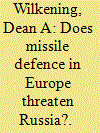

|
|
|
|
|
| Publication |
2012.
|
| Summary/Abstract |
For decades, Russian leaders have expressed concern over American ballistic-missile defence programmes. Early US and Soviet attempts in the 1960s were curtailed by the Anti-Ballistic Missile Treaty of 1972. US proponents of missile defence decried the treaty as an attempt by the Soviet Union to overcome what those proponents believed was America's lead in BMD technology. Russian embrace of the idea that defences upset strategic stability, the central paradigm of the treaty, was suspect because the Soviet Union spent inordinate sums developing strategic air and civil defences, reflecting its conviction that limiting damage from a hypothetical nuclear attack was a worthwhile, if not achievable, goal.
After US President Ronald Reagan's 1983 'Star Wars' speech, Moscow again expressed concern over the US Strategic Defense Initiative, even though such plans were technically fanciful at the time. Within the decade, Russian concerns had subsided, due in part to Russian scientists who noted the infeasibility of many of Reagan's space-based weapons and, more importantly, to more pressing issues raised by the collapse of the Soviet Union. Yet the Strategic Defense Initiative had at least one viable offspring in the form of hit-to-kill interceptors, which were successfully demonstrated in a 1984 test (the Homing Overlay Experiment).
|
|
|
|
|
|
|
|
|
|
|
|
|
|
|
|
| 6 |
ID:
110300
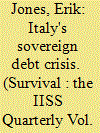

|
|
|
|
|
| Publication |
2012.
|
| Summary/Abstract |
The bond markets turned on Italy in July 2011 as part of a wider loss of confidence in European efforts to manage the sovereign debt crisis. The centre-right government headed by Prime Minister Silvio Berlusconi attempted to head off this change in sentiment by pushing through a package of reforms to promote fiscal consolidation and to stimulate growth. Bond traders shrugged off those actions as too little and too late.
The wider European context played an important role in that assessment. The heads of state and government of the eurozone were already struggling to come up with a second Greek bailout package at the start of the summer. This resulted not only in bitter fights within countries such as Slovakia, Finland and the Netherlands, but also further scrutiny of borrowers in Ireland, Portugal and Spain. Then the European Banking Authority published the results of its second round of stress tests for systemically important European banks. These were designed to calm the markets by factoring in losses on sovereign debt instruments and generating huge volumes of data on cross-border exposure. Instead, the tests merely underscored the belief that the whole European financial system remained fragile.
|
|
|
|
|
|
|
|
|
|
|
|
|
|
|
|
| 7 |
ID:
110303
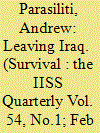

|
|
|
|
|
| Publication |
2012.
|
| Summary/Abstract |
On 19 December 2011, one week after US President Barack Obama welcomed Iraqi Prime Minister Nuri al-Maliki to the White House, and as the final US troops were leaving Iraq, an Iraqi judicial panel issued an arrest warrant for Vice President Tariq al-Hashemi, a Sunni from the rival Iraqi National Movement (also known as 'al-Iraqiyya'), for running a death squad. The warrant provoked yet another crisis in Iraqi politics, and was followed by yet another wave of terrorist bombings that killed and wounded scores.
American expectations about Iraq have been misplaced since the United States decided to invade and topple Saddam Hussein. Iraq was never a threat to the United States, and was not, and is not likely to be, a model for democracy in the Middle East, at least not any time soon. The post-war period in Iraq, and in US-Iraq relations, will instead be marked by uncertainty about Iraq's future and role in the region. Iraq remains a fragile, potentially failing state, where ethnic and sectarian politics still carry the day and external powers all too easily meddle. There is a deep-seated and fundamental lack of consensus about governance among Iraq's leaders. The federal, decentralised state model, enshrined in the Iraqi constitution, is openly contested.
|
|
|
|
|
|
|
|
|
|
|
|
|
|
|
|
| 8 |
ID:
110304
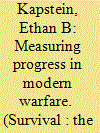

|
|
|
|
|
| Publication |
2012.
|
| Summary/Abstract |
How do governments know whether they're winning or losing a military campaign? This question is devilish enough to answer in the context of conventional wars with pitched battles, let alone the ebb and flow of a long-term counter-insurgency. There is considerable confusion both over what sort of indicators - 'military metrics' - might be useful, and over how they should be used. Although reams of data are currently being collected and reported in Afghanistan and other conflict zones, for example, it is difficult to draw any meaningful conclusions about what, if any, progress is being made.
|
|
|
|
|
|
|
|
|
|
|
|
|
|
|
|
| 9 |
ID:
110299


|
|
|
|
|
| Publication |
2012.
|
| Summary/Abstract |
After decades of trying, Europe still does not get the best value out of the substantial amounts it spends on defence. The experience of the past 20 years suggests that European countries will continue to need to deploy forces in a wide range of operations for a wide range of tasks. Yet defence spending is in a decline that is unlikely to be reversed unless there is a major strategic shock. These two facts suggest that Europe's armed forces will be increasingly squeezed and forced to look for new solutions. They have been under pressure for some time to deliver more effective capabilities with smaller resources, but cuts in spending necessitated by budgetary austerity suggest that these pressures could become acute. European countries can still have strong, and more effective, militaries, but to do so they must make better use of their financial resources.
It is not a matter of falling in with the desperate demand of former US Secretary of Defense Robert Gates, who in 2011 joined the long line of US officials calling for a stronger effort from Europe. It is up to European countries, not the United States, to determine themselves what capabilities they need to deal with the threats they perceive. The present security situation offers plenty of uncertainties, such as those created by the Arab Awakening in Europe's neighbourhood, but no new direct and existential threats to the security of European countries. The diffuse nature of threats in an uncertain world has contributed to a general vagueness about the purpose of maintaining armed forces: defence-policy documents developed since the Balkan conflicts have tended to be laundry lists of potentially dangerous issues with little attempt to prioritise.
|
|
|
|
|
|
|
|
|
|
|
|
|
|
|
|
|
|
|
|
|